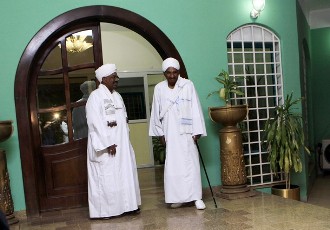“Pro-NCP” Umma Party Sec Gen voted out of office
April 7, 2012 (KHARTOUM) – The Secretary General of the National Umma Party (NUP) Sideeg Ismail conceded defeat at a vote that took place over the weekend during a meeting of the party’s Central Commission (NUPCC).

The report is then subjected to a vote and should a majority stand against it then the Sec Gen, as a matter of tradition, is expected to hand down his resignation or in the alternative a confidence vote would take place.
According to official results announced by the NUP, 284 voted against the report with 252 in favor and five votes considered faulty. More than 300 NUPCC members were not in attendance.
The controversial Sec Gen was widely expected to lose his seat amid accusations by many in the party of him having strong links to the ruling National Congress Party (NCP) led by president Omer Hassan al-Bashir.
Furthermore, many in the party point out that Ismail joined the NUP relatively recently and has a history of working under the regime of late president Ja’afar Nimeiri. The latter is notorious for ruthlessly crushing a rebellion in 1970 which led to the death of Imam al-Hadi al-Mahdi who presided over the Ansar religious sect that has historically formed the base of the NUP.
But despite Ismail’s troubling profile, in the view of many party members, he managed to seal the SG position in 2009 owing to the backing by the NUP chief al-Sadiq al-Mahdi and the Ansar sect. Moreover, his Darfuri origins gave him an edge due the desire of the NUP to give leadership positions to figures who are not from central Sudan.
The NUP’s SG nonetheless alienated many in the NUP during his tenure particularly over his management style and the perception that he was working to bring the party closer to the NCP.
Ismail commented on the vote by saying that he will remain a “trooper” at the NUP and described it as a “genuine democratic exercise”. He also rejected accusations that he is an agent for the ruling party within the NUP.
“You are the ones who gave me your confidence before and you are the ones who can take it away from me. This action [vote] demonstrates the democracy of our institutions and the greatness of our party,” the ex-SG said.
However, he suggested that he is not prepared to take a position within the NUP that is less than what he used to hold as SG.
NUP leader al-Mahdi hailed Ismail’s term though he acknowledged some mistakes on his part but justified it as part of “human effort”.
“The man met the no-confidence vote with composure and masculinity that functions as victory [even] if he did not prevail,” al-Mahdi said.
Ismail was replaced by Ibrahim al-Amin who is considered to be an agreeable figure by most NUP members. Ironically, al-Amin was one of the main contenders against Ismail in the 2009 elections for SG.
The failure of Ismail to get a new term was considered by observers to be the result of the alliance between the ‘General Current’ faction in the party who opposed his selection in 2009 and others who wanted to see him voted out this time.
Sources at the NUP told Sudan Tribune that al-Mahdi initially insisted on bringing a Darfuri figure as replacement arguing that if al-Amin is picked, all leadership positions will be occupied by individuals from central Sudan. He recommended Ali Hassan Tag al-Deen but the floor swiftly rejected his choice.
But despite Ismail’s ouster it remains far from certain that the NUP will move in the direction of active opposition to the ruling NCP. In recent months several memos were drafted by NUP figures and members inside Sudan and abroad urging reform and a clear stance regarding the regime. Some even went as far as calling for the NUP leader to step down himself.
Al-Mahdi dismissed the signatories to the reform memos saying that they will not be able to force change except through the party’s institutions.
The former Prime Minister drew strong criticism last year after giving his blessing for his eldest son Abdel-Rahman to accept the position of Bashir’s presidential assistant. Al-Mahdi insisted that his son acted in his own personal capacity.
The NUP chief has also in recent months distanced himself from the opposition alliance known as the National Consensus Forces and publicly rebuked them saying they are being unrealistic when they call for regime change as they do not have the ability to bring it about.
In the meetings that took place over the weekend, al-Mahdi cautioned against the call for regime change without agreeing on an a viable alternative. He stressed that any vision other than that will prolong NCP rule.
Another pressing item on the NUP agenda is bringing on-board the defectors and particularly those from the disbanded Umma Reform and Renewal Party (URRP) led by Mubarak al-Fadil. The latter, who is al-Mahdi’s cousin, stands to gain the most from Ismail’s departure as the former SG was on bad terms with him.
Al-Mahdi himself directed attacks against al-Fadil at the NUPCC meetings describing him as someone who is out to make trouble and who is allied to South Sudan’s People Liberation Movement (SPLM). He also accused him of standing behind the memos calling for his resignation.
The party’s leader said that all defectors who wish to return can only do so as individuals through the institutions and after pledging to adhere to the NUP’s constitution.
(ST)

